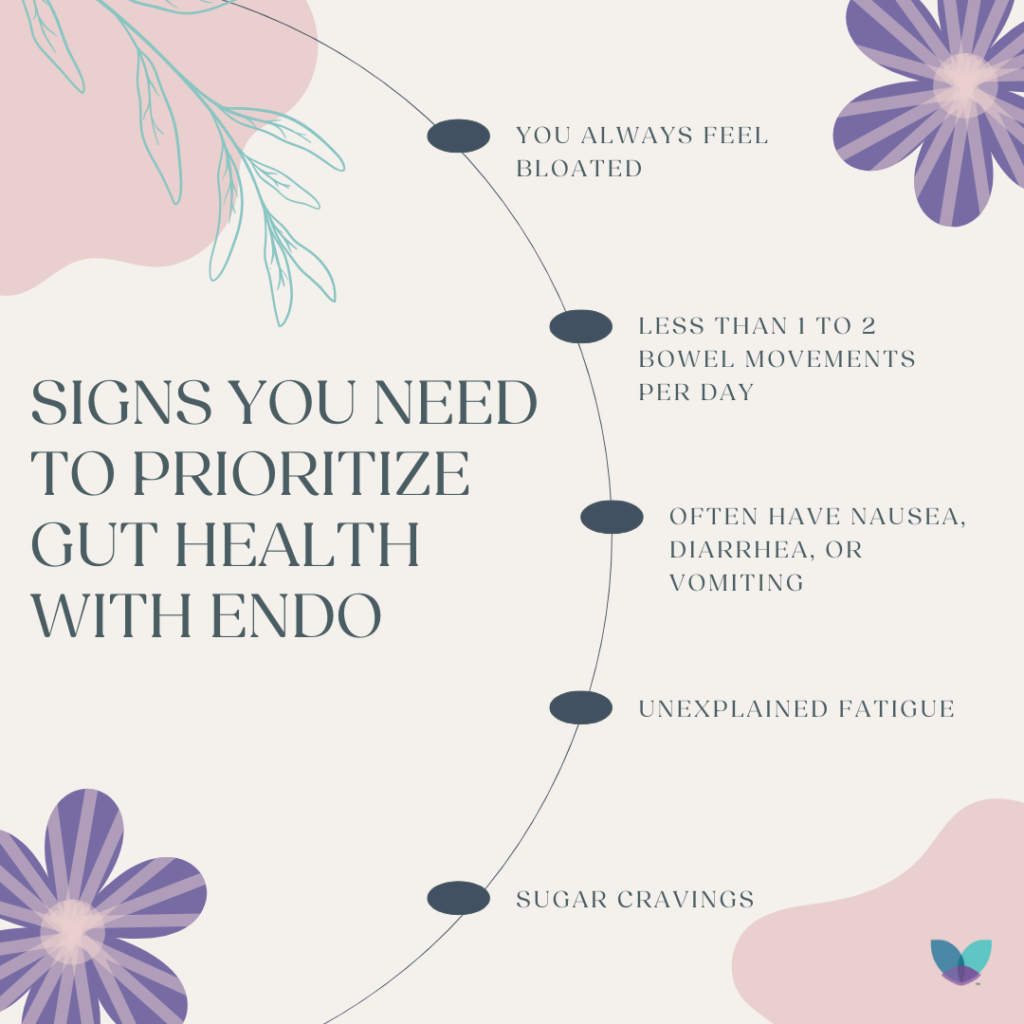Endometriosis is more than just a reproductive health condition. It’s a systemic, inflammatory disease process that impacts the entire body and requires lifelong management. While symptoms like abdominal pain and painful periods may be the most noticeable with endometriosis, the connection between endometriosis symptoms and gut health often flies under the radar. Yet, gut health plays a pivotal role in managing endometriosis and improving overall quality of life while living with the disease.
Why is gut health important for those with endometriosis?
The gut is often referred to as the body’s “second brain” because of its critical role in overall health. For individuals with endometriosis, poor gut health can exacerbate inflammation, hormonal imbalances, and immune dysfunction—all of which are key drivers of the disease. Recognizing the signs that your gut needs extra care can be the first step toward managing your symptoms and feeling your best.

Here are five signs that it’s time to prioritize your gut health if you have endometriosis:
1. You Always Feel Bloated
Bloating is one of the most common endometriosis symptoms, but it can also indicate poor gut health. Known as “endo belly,” this type of bloating can make you feel uncomfortable, sluggish, and self-conscious. Persistent bloating might signal imbalances in your gut microbiome, food sensitivities, or poor digestion—all of which can be addressed through dietary changes and gut-healing strategies.
2. Less Than 1 to 2 Bowel Movements Per Day
Healthy digestion typically involves having one to two bowel movements daily. If you’re experiencing constipation or irregular bowel movements, it could be a sign that your gut isn’t functioning optimally. Endometriosis can contribute to digestive issues by causing inflammation and adhesions in the pelvic region, further underscoring the need for gut-focused care.
3. Frequent Nausea, Diarrhea, or Vomiting
Digestive distress like nausea, diarrhea, or vomiting is another red flag. These symptoms are not only uncomfortable but can also interfere with your ability to absorb essential nutrients. Addressing your gut health can help alleviate these issues and restore balance to your digestive system.
4. Unexplained Fatigue
If you feel tired all the time despite getting enough sleep, your gut could be to blame. An unhealthy gut can lead to systemic inflammation and disrupt the production of neurotransmitters like serotonin, which affects your mood and energy levels. Improving gut health can help reduce fatigue and improve your overall well-being.
5. Sugar Cravings
Do you constantly crave sugary snacks or desserts? This could be a sign of an imbalanced gut microbiome. Harmful gut bacteria thrive on sugar, creating a cycle of cravings that can worsen inflammation and contribute to endometriosis symptoms. Breaking the cycle by focusing on gut health can help you reduce sugar cravings and support hormonal balance.
Steps to Prioritize Gut Health with Endometriosis
Adopt an Anti-Inflammatory Diet: Focus on whole, nutrient-dense foods that support gut health, such as leafy greens, healthy fats, and fermented foods. Avoid processed foods and added sugars that can fuel inflammation.
Stay Hydrated: Drinking plenty of water helps support digestion and nutrient absorption.
Incorporate Probiotics and Prebiotics: Probiotic-rich foods like yogurt, kefir, and sauerkraut can help balance your gut microbiome, while prebiotics like garlic and bananas feed healthy gut bacteria.
Manage Stress: We know it may be cliche to say but chronic stress can actually disrupt gut health. Incorporate stress-relief practices such as yoga, meditation, or deep breathing into your daily routine.
Seek Professional Guidance: Work with a healthcare provider or nutritionist who understands the unique needs of individuals with endometriosis.
By paying attention to your gut and making intentional lifestyle changes, you can better manage endometriosis symptoms and improve your overall health. Prioritizing your gut isn’t just about digestion—it’s about giving your body the support it needs to thrive.
If you’re experiencing endometriosis symptoms that you are struggling to manage on your own, schedule an appointment with an endometriosis specialist at PRM. With 70% of our female patients being diagnosed or having a suspected diagnosis of endo, we are experts in identifying endometriosis symptoms and helping our patients heal.
